1061 scholarly books by Catholic University of America Press and 27
start with W
1061 scholarly books by Catholic University of America Press and 27
1061 scholarly books by Catholic University of America Press
27 start with W start with W
27 start with W start with W
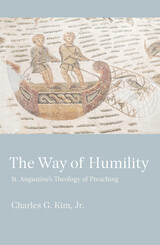
The Way of Humility
St. Augustine's Theology of Preaching
Charles J. Kim
Catholic University of America Press, 2023
For Augustine, that the Word became flesh transformed a merely human understanding of the virtues and grounds all virtue in humility. The Way of Humility: Augustine’s Theology of Preaching explores how this truth became a new paradigm for understanding the scriptures and thus, how Augustine embodied the virtue in the preaching of the scriptures. One of Augustine’s most devoted students, Possidius, said that anyone can learn from reading Augustine, but “those were able to profit still more who could hear him speak in church and see him with their own eyes. Truly, he was indeed one of those of whom it is written, ‘speak this way and act the same way.’” The Way of Humility searches for evidence of the virtue of humility in action through the preaching of the humble Word in the sermons of Augustine.
Many know of Augustine through his more famous treatises but few have encountered the Doctor of Grace where he had his most immediate impact, preaching. The Way of Humility follows the sermons through several traditional theological loci, ecclesiology, Christology, soteriology to uncover what can be learned about Augustine’s theology through the way he preached to a mixed audience of urbanites and rustics, many of whom did not have the benefit of a formal education. Throughout the book, we see the interplay between Augustine’s action in speech and Augustine’s more direct statements on his theology of Preaching. Through handing over Christ in his sermons, he became himself an example of humility for the congregation on their journey toward the final end for all people, the Beatific Vision.
[more]
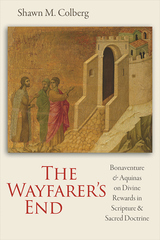
The Wayfarer's End
Bonaventure and Aquinas on Divine Rewards in Scripture and Sacred Doctrine
Shawn M. Colberg
Catholic University of America Press, 2020
The Wayfarer’s End follows the human person’s journey to union with God in the theologies of Saint Bonaventure and Saint Thomas Aquinas. It argues that these seminal thinkers of the 13th Century emphasize scriptural notions of divine rewards as ordering principles for the graced movement of human viators to eternal life. Divine rewards emerge as a fundamental category through the study’s emphasis on Thomas and Bonaventure as scriptural commentators and preachers whose work in sacra pagina structures the content of their sacra doctrina. Shawn Colberg places Bonaventure’s and Aquinas’s scriptural, dogmatic, and polemical works into conversation and illumines their mutually edifying depictions of the way to eternal life.
Looking to the journey itself, The Wayfarer’s End demonstrates a nuanced understanding of the roles played by God and human beings in the movement to full beatitude. To that end, it explores the relationships between grace and human nature, the effects of sin on the human person, the vital themes of predestination, conversion, perseverance, and the place of “reward-worthy” human action within the overall movement toward union with God. While St. Bonaventure and St. Thomas both stress the priority of grace and divine action for the journey, the study also illustrates their distinct frameworks for human action, unpacking Bonaventure’s preference for the language of acceptatio versus Thomas’s emphasis on ordinatio. This difference inflects their language of rewards, their exposition of scripture, and the scope of free human action in the movement to union with God.
This study places the two most seminal theologians of the 13th Century into conversation on central and enduring topics of Christian life. Such a comparative study has been sorely lacking in the field of studies on Aquinas and Bonaventure. It offers insight to those interested in high scholastic thought, Franciscan and Dominican understandings of human salvation, and Thomist and Franciscan theology as it pertains to questions of the Reformation, including biblical exegesis on justification and sanctification. Above all, the study appreciates and foregrounds the richness of Bonaventure’s and Aquinas’s vocations: mendicant theologians concerned to share the fruits of contemplation with fellow friars and others seeking the goal of the wayfarer’s end.
[more]
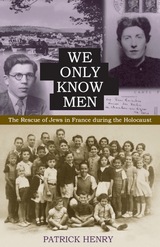
We Only Know Men
The Rescue of Jews in France during the Holocaust
Patrick Henry
Catholic University of America Press, 2007
Patrick Henry, working with more than one thousand unpublished autobiographical pages written by key rescuers and with documents, letters, and interviews never before available, reconsiders the Holocaust rescue of Jews on the plateau of Vivarais-Lignon between the years 1939 and 1944
[more]
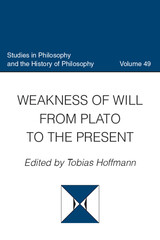
Weakness of Will from Plato to the Present (Studies in Philosophy and the History of Philosophy, Volume 49)
Tobias Hoffmann
Catholic University of America Press, 2008
In thirteen original essays, eminent scholars of the history of philosophy and of contemporary philosophy examine weakness of will, or incontinence--the phenomenon of acting contrary to one's better judgment.
[more]
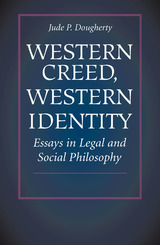
Western Creed, Western Identity
Essays in Legal and Social Philosophy
Jude P. Dougherty
Catholic University of America Press, 2000
In Western Creed, Western Identity, Jude P. Dougherty investigates the classical roots of Western culture and its religious sources in an effort to define its underlying intellectual and spiritual commitments.
[more]
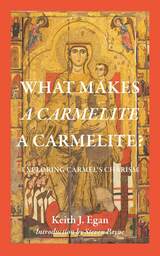
What Makes a Carmelite a Carmelite
Exploring Carmel's Charism
Keith J. Egan
Catholic University of America Press, 2022
Vatican II initiated lively conversations about the identity of religious orders and congregations when the council pointed out that these religious communities are divine gifts in and to the church. Keith Egan examines the nature of these charisms including, not only the original or founders’ charism, but how charisms evolve over the centuries. Special theological attention to these charisms show that they are not something but, in fact, are the dynamic presence of the Holy Spirit.
This volume offers a case study the original charism of the Carmelites. The first Carmelites originated when various hermits were displaced by the armies of Saladin. These dislodged hermits sought refuge on Mount Carmel in a ravine facing the Mediterranean Sea. There, these hermits, now Carmelites, sought from Saint Albert, Patriarch of Jerusalem, a description of their life of solitude. Albert’s Formula of Life describes the original Carmelite charism as a life of prayer and contemplation. This Formula eventually became a Rule that made possible a transformation of hermits into friars. Egan is at work on a sequel that examines this radical transformation.
[more]
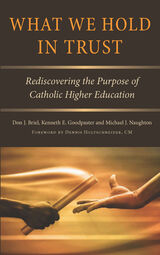
What We Hold in Trust
Rediscovering the Purpose of Catholic Higher Education
Don Briel
Catholic University of America Press, 2021
The specific concern in What We Hold in Trust comes to this: the Catholic university that sees its principal purpose in terms of the active life, of career, and of changing the world, undermines the contemplative and more deep-rooted purpose of the university. If a university adopts the language of technical and social change as its main and exclusive purpose, it will weaken the deeper roots of the university’s liberal arts and Catholic mission. The language of the activist, of changing the world through social justice, equality and inclusion, or of the technician through market-oriented incentives, plays an important role in university life. We need to change the world for the better and universities play an important role, but both the activist and technician will be co-opted by our age of hyper-activity and technocratic organizations if there is not first a contemplative outlook on the world that receives reality rather than constructs it.
To address this need for roots What We Hold in Trust unfolds in four chapters that will demonstrate how essential it is for the faculty, administrators, and trustees of Catholic universities to think philosophically and theologically (Chapter One), historically (Chapter Two) and institutionally (Chapters Three and Four). What we desperately need today are leaders in Catholic universities who understand the roots of the institutions they serve, who can wisely order the goods of the university, who know what is primary and what is secondary, and who can distinguish fads and slogans from authentic reform. We need leaders who are in touch with their history and have a love for tradition, and in particular for the Catholic tradition. Without this vision, our universities may grow in size, but shrink in purpose. They may be richer but not wiser.
[more]
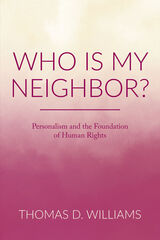
Who is my neighbor?
personalism and the foundations of human rights
Thomas D. Williams
Catholic University of America Press, 2005
Who Is My Neighbor? makes an original, compelling case for human rights as moral entitlements grounded in the dignity of the human person.
[more]
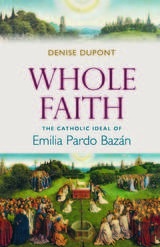
Whole Faith
The Catholic Ideal of Emilia Pardo Bazan
Denise DuPont
Catholic University of America Press, 2018
Emilia Pardo Bazán (1851-1921), the most important female author of Spain’s nineteenth century, was a prolific writer of novels, short stories, critical articles, chronicles of modern life, and plays. Active in the age of Catholic social teaching inaugura
[more]

Whose Sacrifice is the Eucharist? The Offering of Christ and His Church in Catholic and Methodist Theology
Stephen B. Sours
Catholic University of America Press, 2024
This book explores what Catholics and Methodists believe about eucharistic sacrifice. Eucharistic sacrifice refers to the offering that Christ and his church make in the celebration of the Lord’s Supper. It is, therefore, both a Christian doctrine and a church practice. The sacrificial dimension of the sacrament comes both from Christ’s sacrifice on the cross and from his self-offering at the Last Supper in which Christ gives himself to the Father on behalf of his people. “This is my body, which is given for you” (Luke 22:19). The eucharist is a sacrificial meal because in the bread and cup Christians are united to the body and blood of Christ that was sacrificed for them on the cross. Moreover, the resurrected Lord is really present with his people in the eucharist, and while his historic crucifixion is an event in the past, Jesus’ salvation continues and his grace is given to his people in the sacrament, “for this is my blood of the covenant, which is poured out for many for the forgiveness of sins” (Matthew 26:28). Catholics and Methodists believe that Jesus instructs his followers to repeat his words and actions from the Last Supper in their celebration of the eucharist, but a long running assumption is that Catholics and Methodists—following the historic Reformation schism—are deeply divided over eucharistic sacrifice. This book challenges that assumption by analyzing what these churches teach on eucharistic sacrifice from historical, sacramental, liturgical, and ecumenical perspectives. Key figures like Thomas Aquinas and John Wesley help define eucharistic sacrifice in each tradition. Subsequently, authoritative texts such as ecclesial statements, eucharistic prayers, and hymns further specify what Catholics and Methodists believe they are doing when they offer the eucharist to God. Sours argues that far from being divided, Catholics and Methodists have much in common regarding this controversial doctrine.
[more]
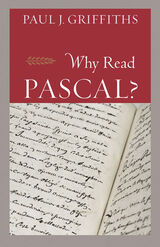
Why Read Pascal?
Paul J. Griffiths
Catholic University of America Press, 2021
Blaise Pascal (1623-1662) is known in the English-speaking world principally for the wager (an argument that it is rational to do what will affect belief in God and irrational not to), and, more generally, for the Pensées, a collection of philosophical and theological fragments of unusual emotional and intellectual intensity collected and published after his death. He thought and wrote, however, about much more than this: mathematics; physics; grace, freedom, and predestination; the nature of the church; the Christian life; what it is to write and read; the order of things; the nature and purpose of human life; and more. He was among the polymaths of the seventeenth century, and among the principal apologists of his time for the Catholic faith, against both its Protestant opponents and its secular critics.
Why Read Pascal? engages all the major topics of Pascal's theological and philosophical writing. It provides discussion of Pascal's literary style, his linked understandings of knowledge and of the various orders of things, his anthropology (with special attention to his presentation of affliction, death, and boredom), his politics, and his understanding of the relation between Christianity and Judaism. Pascal emerges as a literary stylist of a high order, a witty and polemical writer (never have the Jesuits been more thoroughly eviscerated), and, perhaps above all else, as someone concerned to show to Christianity's cultured despisers that the fabric of their own lives implies the truth of Christianity if only they can be brought to look at what their lives are like.
Why Read Pascal? is the first book in English in a generation to engage all the principal themes in Pascal's theology and philosophy. The book takes Pascal seriously as an interlocutor and as a contributor of continuing relevance to Catholic thought; but it also offers criticisms of some among the positions he takes, showing, in doing so, how lively his writing remains for us now.
[more]
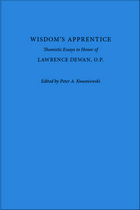
Wisdom's Apprentice
Thomistic Essays in Honor of Lawrence Dewan, O.P.
Peter A. Kwasniewski
Catholic University of America Press, 2007
In Wisdom's Apprentice, twelve distinguished scholars pay grateful homage to their friend and mentor in recognition of his extraordinary contributions to the study of the philosophia perennis
[more]
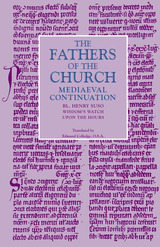
Wisdom's Watch Upon the Hours
Suso Henry
Catholic University of America Press, 1994
Written by Dominican preacher and mystic Bl. Henry Suso (c. 1300-1366), Horologium Sapientiae, or Wisdom's Watch upon the Hours, was one of the most successful religious writings of its time. Now it is offered to the English-speaking world in a new translation based on Pius Knzle's critical Latin edition.
[more]
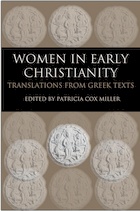
Women in Early Christianity
Translations from Greek Texts
Patricia Cox Miller
Catholic University of America Press, 2005
What emerges from these texts is a colorful portrayal of the many faces of ancient Christian women in their roles as teachers, prophets, martyrs, widows, deaconesses, ascetics, virgins, wives, and mothers.
[more]
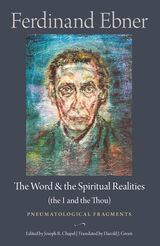
The Word and the Spiritual Realities (the I and the Thou)
Ferdinand Ebner
Catholic University of America Press, 2021
This volume will constitute the first published English translation of Ferdinand Ebner’s seminal 1921 work, Das Wort und die geistigen realitäten – long available in major languages but never in English. It is frequently compared with Martin Buber’s, I and Thou, published in 1923, which actually draws its central I-Thou insight from Ebner.
In recent centuries, Philosophy reflects a turn toward the autonomous subject vs. a biblical sense of person. The limits/failures of science manifest in the horrors of World War I led to the emergence of a “Dialogical Personalist Philosophy” in reaction to the universal doubt of Cartesian thought and to German Idealism, which engages the idea or representation but not the reality of “things-in-themselves.”
The core of Ebner: human speech is constitutive of human existence: humans are given the "word." "Having the word" is a miraculous gift from God. It is only in the word, in language, that an "I" meets a "Thou," that relationship and self-identity can occur, and this word is given in Jesus Christ, the Word made flesh: “In the beginning was the Word”; Jesus, the Logos of St. John's Gospel, mediates between God and man and “stands” between I and Thou. It is through Jesus that it is possible to address God in the human thou.
The key to life’s meaning, to the centrality of relationship, and to God's continuous action in His creation, is found in the I-Thou question: why the I can never be found in itself, and so must look in the thou, while the false I will try to possess the thou as an object of power. This is Ebner's critique of idealist thought: reality, truth, and personal identity are neither ideas, nor found in ideas, therefore, Descartes' cogito must be rejected, for the existence of the I can't be founded or proved by solitary thinking, but only in relation with a thou.
[more]

Words Made Flesh
The Sacramental Mission of Catholic Education
R. Jared Staudt
Catholic University of America Press, 2024
Forming souls and building culture together form the sacramental mission of Catholic education. These profoundly related goals are laid out by the Church for education, following the general sacramental principle that permeates the whole of Catholic life. This approach seeks conformity to the Logos, the divine mind, that shapes the way disciples think, imagine, and pray. Guided by this approach, the student will be able to contemplate the truth of reality in a holistic and integrated fashion. As sacramental, it also leads to a concrete embodiment in the life of the Christian community and the daily actions of the disciple. A sacramental approach to education draws together the inner and outer life: mind and body, soul and culture, prayer and work, salvation and mission, the individual and community. For the future of society and renewal within the Church, we need nothing less than a reintegration of the person and our communities through the renewal of education, forming students deeply rooted in our heritage and prepared to hand it on in creative ways.
[more]
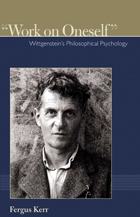
"Work on Oneself"
Wittgenstein's Philosophical Psychology (Institute for the Psychological Sciences Monograph Series, Volume 1)
Fergus Kerr
Catholic University of America Press, 2008
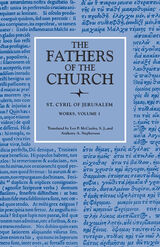
The Works of Saint Cyril of Jerusalem, Volume 1
Saint Cyril of Jerusalem
Catholic University of America Press, 1969
No description available
[more]
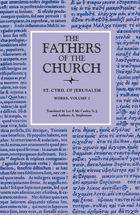
The Works of Saint Cyril of Jerusalem, Volume 2
Saint Cyril of Jerusalem
Catholic University of America Press, 1970
No description available
[more]
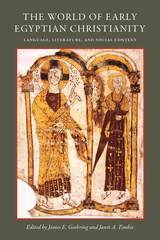
The World of Early Egyptian Christianity
Language, Literature, and Social Context (CUA Studies in Early Christianity)
James E. Goehring
Catholic University of America Press, 2007
With increasing interest in early Egyptian (Coptic) Christianity, this volume offers an important collection of essays about Coptic language, literature, and social history by the very finest authors in the field. The essays explore a wide range of topics and offer much to the advancement of Coptic studies
[more]
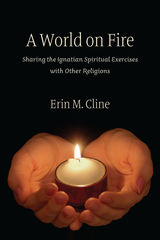
A World On Fire
Sharing the Ignatian Spiritual Exercises with Other Religions
Erin M. Cline
Catholic University of America Press, 2018
The Spiritual Exercises of St. Ignatius of Loyola give shape to the spiritual lives of Jesuits and many other Christians. But might these different ways of praying, meditating, and reading scripture be helpful to members of other faiths as well? In response to the call of Fr. Adolfo Nicolas, SJ, the thirtieth Superior General of the Jesuits (2008-2016) to explore how the Ignatian Spiritual Exercises can be fruitfully appropriated by non-Christians, A World on Fire analyzes the prospects for adapting the Spiritual Exercises in order to make them accessible to members of other faith traditions while still maintaining their core meaning and integrity.
Erin Cline examines why this ought to be done, for whom, and what the aims of such an adaptation would be, including the different theological justifications for this practice. She concludes that there are compelling reasons for sharing the Exercises with members of other religions and that doing so coheres with the central mission of the Jesuits. A World on Fire goes on to examine the question of how the Exercises can be faithfully adapted for members of other religions. In outlining adaptations for the Hindu, Buddhist, and Confucian traditions that draw upon the traditional content of the Exercises supplemented by the texts of these religious traditions, Cline shows how Ignatian spirituality can help point the way to a different kind of inter-religious dialogue – one that is not bound up in technical terminology or confined to conversations between theologians and religious leaders. Rather, in making the Spriitual Exercises accessible to members of other faith traditions, we are as Pope Francis puts it, “living on a frontier, one in which the Gospel meets the needs of the people to whom it should be proclaimed in an understandable and meaningful way.”
A World on Fire will be of interest to comparative theologians and scholars working on inter-religious dialogue, religious pluralism, contemplative studies, and spirituality, as well as Jesuit priests and other practitioners who employ the Spiritual Exercises in their ministry.
Erin Cline examines why this ought to be done, for whom, and what the aims of such an adaptation would be, including the different theological justifications for this practice. She concludes that there are compelling reasons for sharing the Exercises with members of other religions and that doing so coheres with the central mission of the Jesuits. A World on Fire goes on to examine the question of how the Exercises can be faithfully adapted for members of other religions. In outlining adaptations for the Hindu, Buddhist, and Confucian traditions that draw upon the traditional content of the Exercises supplemented by the texts of these religious traditions, Cline shows how Ignatian spirituality can help point the way to a different kind of inter-religious dialogue – one that is not bound up in technical terminology or confined to conversations between theologians and religious leaders. Rather, in making the Spriitual Exercises accessible to members of other faith traditions, we are as Pope Francis puts it, “living on a frontier, one in which the Gospel meets the needs of the people to whom it should be proclaimed in an understandable and meaningful way.”
A World on Fire will be of interest to comparative theologians and scholars working on inter-religious dialogue, religious pluralism, contemplative studies, and spirituality, as well as Jesuit priests and other practitioners who employ the Spiritual Exercises in their ministry.
[more]
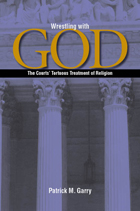
Wrestling with God
The Courts' Tortuous Treatment of Religion
Patrick M. Garry
Catholic University of America Press, 2006
Courts have often treated the two religion clauses of the First Amendment as contradictory, with the free exercise clause used to protect religious practices and the establishment clause employed to limit the public expression of religious beliefs. Wrestling with God not only reconciles the relationship between the two clauses but also distinguishes them in terms of their respective purposes.
[more]
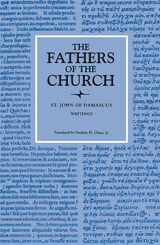
Writings
Saint John of Damascus
Catholic University of America Press, 1958
St. John of Damascus (ca. 675-749) is generally regarded as the last great figure of Greek Patrology
[more]
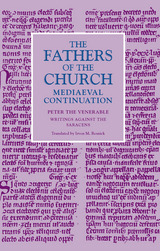
Writings Against the Saracens
Peter the Venerable
Catholic University of America Press, 2016
Peter the Venerable's extensive literary legacy includes poems, a large epistolary collection, and polemical treatises. The first of his four major polemics targeted a Christian heresy, the Petrobrussians (Against the Petrobrusians); the rest took aim at Jews and Saracens. Catholic University of America Press has published his Against the Inveterate Obduracy of the Jews. This present volume will make available in their entirety Peter the Venerable's twin polemics against Islam - A Summary of the entire heresy of the Saracens and Against the sect of the Saracens - as well as related correspondence. These works resulted from a sustained engagement with Islam begun during Peter's journey to Spain in 1142-43. There the abbot commissioned a translation of sources from the Arabic, the so-called Toledan Collection, that include the Letter of a Saracen with a Christian Response (from the Apology of [Ps.] Al-Kindi ); Fables of the Saracens (a potpourri of Islamic hadith traditions); and Robert of Ketton's first Latin translation of the whole of the Qur'an. Thanks to Peter's efforts, from the second half of the twelfth century Christians could acquire a far better understanding of the teachings of Islam, and Peter may rightly be viewed as the initiator of Islamic studies in the West.
[more]
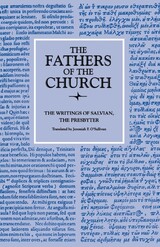
The Writings of Salvian, the Presbyter
The Presbyter Salvian, The Presbyter
Catholic University of America Press, 1947
No description available
[more]
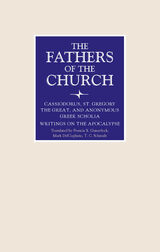
Writings on the Apocalypse
Francis X. Gumerlock
Catholic University of America Press, 2022
The Apocalypse or Book of Revelation is one of the most frequently discussed books of the biblical canon and arguably one of the most difficult to interpret. This volume contains three texts as examples of late ancient Christian interpretation of its intriguing visions. It also includes a comprehensive introduction to each text by its respective translator. Brief Explanations of the Apocalypse by Cassiodorus (c. 580), translated by Francis X. Gumerlock from Latin and published in English for the first time in this volume, served as an introduction to the Book of Revelation for Cassiodorus’s students at the Vivarium, a monastery in southern Italy. Cassiodorus divided the Apocalypse into 33 sections, corresponding to the age of Jesus at his Passion, and expressed his belief that John’s visions were revelations of the end of the world, including the Second Coming of Christ for judgment, the defeat of the Antichrist, the general resurrection, and the arrival of the heavenly Kingdom. Testimonies of Gregory the Great on the Apocalypse, translated from Latin by Mark DelCogliano and also published here for the first time in English, is a collection of 55 excerpts on the Apocalypse from the writings of St. Gregory the Great (d. 604) compiled by an anonymous author. Drawn mainly from Gregory’s Moralia, but also from his Book on Pastoral Care and homilies, the excerpts, which are arranged from Revelation 1.4 to 22.17, illustrate Gregory’s grammatical exegesis of the Apocalypse, his interpretation of various figures in the Apocalypse, and his attempt to reconcile certain passages in the Apocalypse with seemingly contradictory texts from other parts of Scripture. The anonymous Greek Scholia on the Apocalypse contains 39 exegetical notes on chapters 1-14 of the Apocalypse, which reveal influences of Origen and Didymus the Blind, among others. The notes provide “spiritual” interpretations of the various passages and give attention to the interpretation of certain words that appear in the Book of Revelation. This new translation from the Greek by T. C. Schmidt utilizes all the Greek editions. Furthermore, its introductory matter contains updates on the Scholia from the latest scholarship and compares each scholion with interpretations found in various patristic authors, mainly of Alexandrian heritage.
[more]
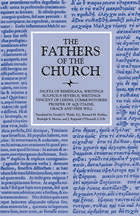
Writings; Writings; Commonitories; Grace and Free Will
Nicetas of Remesiana
Catholic University of America Press, 2008
No description available
[more]
READERS
Browse our collection.
PUBLISHERS
See BiblioVault's publisher services.
STUDENT SERVICES
Files for college accessibility offices.
UChicago Accessibility Resources
home | accessibility | search | about | contact us
BiblioVault ® 2001 - 2024
The University of Chicago Press









